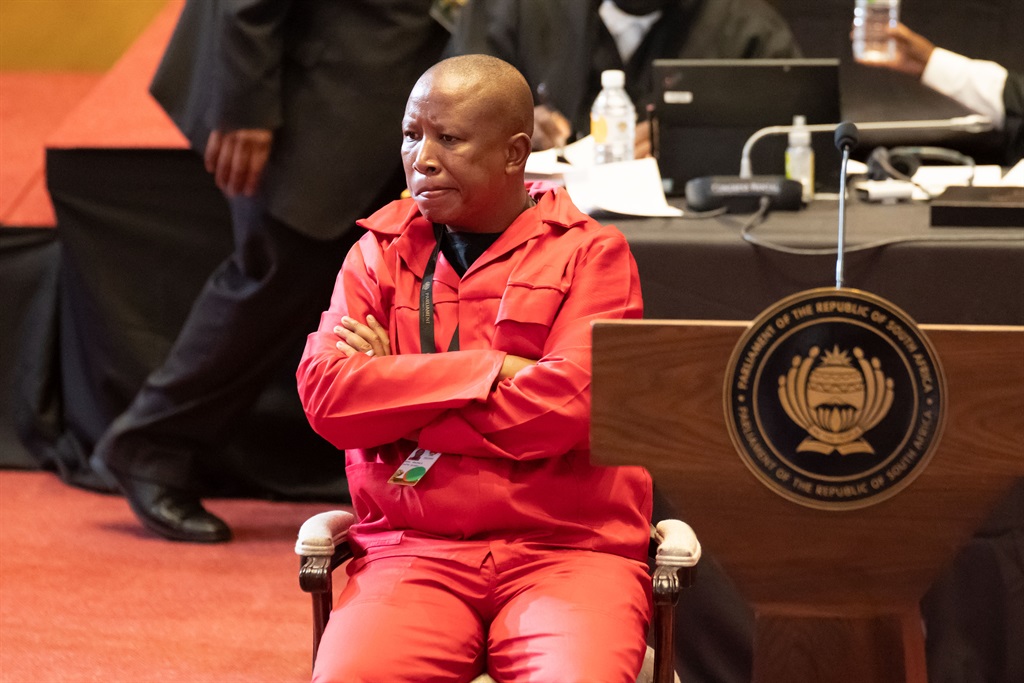
Veronica Mente reflects on the violence the EFF's uniform has attracted in a decade of the party's existence, writing that despite facing accusations of being mere spectacle and populist, the EFF has triumphed.
The Marikana massacre of 2012 served as a pivotal moment in South Africa's history, shedding light on the harsh realities faced by mine workers and the pressing need for change. From this tragedy emerged the Economic Freedom Fighters (EFF), our political party dedicated to championing the rights of the marginalised and dispossessed, particularly the working class.
Our distinctive attire, featuring red overalls, gumboots, hardhats, domestic worker uniforms and the iconic red beret, carried profound symbolism, rooted in the struggles of mineworkers and domestic workers, intertwining the threads of exploitation, inequality, and resistance that shape our labour system.
In our inaugural elections in May 2014, even before entering Parliament, we captured attention with their bold style. By choosing the vibrant colour red, synonymous with the bloodshed of Africa's wars of liberation as well as communism, we harnessed the power of symbolism and fashion. While the ANC initially declared war on us, the impact and appeal of our style, particularly the red beret, prompted both parties to create their own versions for the 2014 elections.
Making a statement
May 2014 witnessed the resounding triumph of the EFF, as we seized a formidable 6.35% of the vote, commanding an impressive 25 parliamentary seats. Notably, our ascension extended beyond the ballot box, as we claimed the esteemed status of official opposition in the provinces of Limpopo and North West.
From the very moment of our inauguration, we made an indelible statement, the women within our ranks boldly adorned themselves in domestic worker uniforms accompanied by aprons while others donned red overalls, hardhats, and gumboots. In this striking attire, we honoured the profound historical legacies of the mineworkers and the domestic workers, symbolising the enduring impact of gendered migrant labour during the apartheid era.
Our first deputy secretary general and parliamentary whip Hlengiwe Mkhaliphi, made it clear that:
In a brazen display of opposition, the ANC and other political parties contested our adherence to the dress code of the esteemed National Assembly, vehemently demanding the prohibition of our distinct red overalls and trademark attire. Amplifying these calls, the Freedom Front Plus disdained, denouncing it as lacking "decorum" and dismissed it as an undignified form of dressing.
The confrontation reached a fever pitch in June 2014, when our members in the Eastern Cape legislature were forcibly barred from attending the State of the Province address on the grounds of their defiant red overalls, deeming their attire inappropriate.
The situation escalated, prompting the intervention of security personnel as tensions mounted. Resisting this audacious act, EFF members valiantly protested, asserting that the code of conduct merely required attendees to be "neat and clean," refusing to yield to the suppression of their rights.
Continuing this display of authoritarianism, the police were summoned in July 2014 to forcibly remove EFF officials from the Gauteng legislature, deeming their attire, particularly the prominent inscription of "Asijiki" on their overalls, as inappropriate and incendiary.
The chamber descended into darkness as TV monitors were abruptly switched off, and the media was unceremoniously expelled, shrouding the unfolding events in obscurity. In protest, we marched, as an organisation, on the Gauteng legislature and were met with rubber bullets and tear gas, despite our peaceful walk.
An even more brutal episode occurred in the North West legislature where the women members of the EFF were assaulted during forced removal to the point where their clothing was ripped, compromising their dignity.
Accusations of engaging in populist tactics
Uhuru Moiloa, the then-Gauteng legislature deputy speaker, arrogantly declared, "We cannot be bogged down by political gimmicks of overalls. We are about improving the quality of life for the people of South Africa."
Our determination, however, knew no bounds, even contesting the legislature's decision in the Gauteng High Court in Johannesburg which affirmed the EFF's right to don their uniforms.
The ANC brandished their majority as a weapon, threatening to exploit it for their own agenda. And they did in several legislatures where they created new dress codes as a punitive measure against the EFF. Astonishingly, the ANC's true intentions were laid bare—to suppress any perceived threat rather than harness their power for meaningful change. However, their grip on the majority has since weakened, diminishing their ability to dictate terms. Desperate to exert control, the ANC went as far as crafting an entirely new dress code explicitly targeted at us.
In a sea of sceptical voices and dismissive narratives, we faced scathing accusations of orchestrating a mere "spectacle" and engaging in "populist" tactics solely to attract attention. Detractors dismissed us as "empty of substance" and condemned our engagement as nothing more than "hype over politics." Pundits confidently prophesied the party's swift demise, relegating us to a position of inconsequentiality within the realm of South African politics.
READ | ANALYSIS: Sheldon Morais - Fear factor - Did the EFF claim an easy victory with tepid shutdown?
However, defying the naysayers and refusing to be silenced, Julius Malema fearlessly confronted Parliament. In a powerful act of defiance, he boldly declared that if we were denied the freedom to dress according to our chosen attire, we would shed our garments and stand naked in protest. Moreover, Malema asserted that the attire of workers held a profound sense of honour, just as dignified as any garments previously worn within the halls of Parliament over the past two decades. His unwavering stance challenged the deeply ingrained biases that had long permeated the corridors of power, confronting the entrenched notion of what is deemed acceptable and respectable.
By February 2015, the National Assembly rules committee, recognising the futility and injustice of such a measure, took a stand and deemed its implementation unjustifiable. The ANC's oppressive tactics were thwarted, and their attempt to curtail our expression and representation was unequivocally rebuffed. The EFF stood resolute in their ideological stance, and they were not alone in their conviction. Raymond Suttner, a seasoned political commentator, emphatically expressed that the party's decision to enter Parliament adorned in boiler suits and overalls was part of a rich legacy of political agitation, employing powerful imagery to convey their message. He added that by embracing the colour red, we had skilfully appropriated the symbolism associated with the blood of workers and the historical connections to socialists and communists.
Colonial mentality
Suttner went on to expose the ANC's attempt to impose a restrictive "dress code," revealing it as a perpetuation of colonial imagery and the politics of respectability. In doing so, the ANC sought to define what is deemed appropriate and who is deemed suitable to inhabit the sacred space of the National Assembly. This standpoint, however, wilfully disregarded the undeniable truth that many who graced the halls of Parliament, both then and now, are the direct descendants of mineworkers, garden boys, and domestic workers. Their contributions and experiences, shaped by toil and struggle, were systematically overlooked in the pursuit of an exclusive vision of decorum.
READ | ANALYSIS: Malema, the EFF and a history of violence
A relentless battle for sartorial freedom has raged unabated within the confines of the Eastern Cape Bhisho legislature, marking the longest war waged in the name of attire liberation. The year 2015 witnessed a pivotal turning point as the dress code was unscrupulously altered, serving as a punitive measure aimed squarely at suppressing us. Since then, an unrelenting stream of injustices has unfolded, with our members repeatedly subjected to expulsion and exclusion from council meetings. In this context, it is inconceivable that a legislature should be permitted to operate with complete disregard for the precedents set by the National Assembly and other legislatures.
This violent reception, and more we have endured since our entry into Parliament and legislative bodies, evokes a deep sense of unease and disturbance. It is profoundly disconcerting that, in the name of determining what is deemed "appropriate," the immediate resort to police force and security measures as deemed necessary to forcibly remove individuals who had every right to be present. This reactionary response exposes a troubling undercurrent rooted in a colonial mindset, one that perceives black people, particularly labourers, as disposable.
Furthermore, the persistent and unabated call for violence against our women members is deeply unsettling. There is no concern for our safety and our discomfort with being manhandled with no intervention from other political parties. In a nation plagued by alarmingly high levels of violence against women, it is even unsurprising to witness such behaviour being tolerated and even applauded simply because we hold differing political ideologies.
Nevertheless, we stand resolute as we commemorate a decade of unwavering resilience in our struggle. Despite facing accusations of being mere spectacle and populist, we have triumphed.
We have transcended the violence hurled at us while steadfastly championing the rights of workers in this nation. We have defied the sceptics who predicted our swift demise. Our presence in Parliament has grown, and our influence extends to governing positions nationwide.
Everywhere our members walk, we are greeted by cleaners and general workers, who recognise their own reflection in our movement. This journey would not have been possible without the unwavering support and trust they have bestowed upon us.
- Veronica Mente is the National Chairperson of the Economic Freedom Fighters and EFF Parliamentary Whip.
*Want to respond to the columnist? Send your letter or article to opinions@news24.com with your name and town or province. You are welcome to also send a profile picture. We encourage a diversity of voices and views in our readers' submissions and reserve the right not to publish any and all submissions received.
Disclaimer: News24 encourages freedom of speech and the expression of diverse views. The views of columnists published on News24 are therefore their own and do not necessarily represent the views of News24.




 Publications
Publications
 Partners
Partners






















